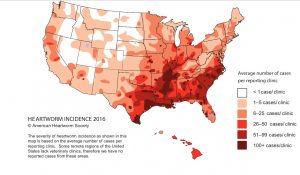Studies by the American Heartworm Society have found that heartworm infections are increasing across the United States.

What is Heartworm Disease?
Heartworm disease is caused by the parasite Dirofilaria immitis, a type of worm that lives inside the pulmonary arteries (blood vessels in the lungs) and heart. Heartworm disease is transmitted by mosquitoes. When a mosquito infected with the heartworm larvae bites a dog or cat the larvae  enter under their skin. The heartworm larvae migrate into the animal’s bloodstream and become adult heartworms after 6 months. It is a serious disease that primarily affects the heart and lungs but can also affect other organs. If left untreated heartworm disease causes heart failure and death.
enter under their skin. The heartworm larvae migrate into the animal’s bloodstream and become adult heartworms after 6 months. It is a serious disease that primarily affects the heart and lungs but can also affect other organs. If left untreated heartworm disease causes heart failure and death.
Symptoms
Symptoms of heartworm disease in dogs include coughing, lethargy, exercise intolerance, lack of appetite, and sudden death. Unfortunately sometimes by the time symptoms occur it can be too late to treat heartworm disease. Cats with heartworm disease can have trouble breathing or sudden death. It is best not to wait until symptoms develop since irreversible damage may have already occurred by then.
Who is at risk?
 All dogs and cats who are not on heartworm prevention are at risk. Heartworm disease has been found in all fifty states, though it is more prevalent in the south. Studies by the American Heartworm Society have found that heartworm infections are increasing across the United States. While most people know that heartworm disease affects dogs, many are unaware that it can also affect cats.
All dogs and cats who are not on heartworm prevention are at risk. Heartworm disease has been found in all fifty states, though it is more prevalent in the south. Studies by the American Heartworm Society have found that heartworm infections are increasing across the United States. While most people know that heartworm disease affects dogs, many are unaware that it can also affect cats.
How is heartworm disease it diagnosed?
Heartworm disease is most commonly diagnosed using blood tests that detect the presence of heartworm antigens. Testing for heartworm disease in cats is less reliable than in dogs. Depending on the test results and the animal’s symptoms additional laboratory tests, radiographs and a cardiac ultrasound may also be recommended to determine infection and severity.
How is it treated?
The goal of treatment is to kill the heartworms without harming the patient. Fortunately, the  treatment options have improved but they still have potential risks. Infected animals usually receive a series of medications, and intramuscular injections, hospitalization, and strict confinement to limit exercise for weeks to months. The truth is, treatment is expensive, time consuming, and has the potential for risks. For these reasons the goal should always be prevention rather than treatment of this horrible disease.
treatment options have improved but they still have potential risks. Infected animals usually receive a series of medications, and intramuscular injections, hospitalization, and strict confinement to limit exercise for weeks to months. The truth is, treatment is expensive, time consuming, and has the potential for risks. For these reasons the goal should always be prevention rather than treatment of this horrible disease.
Prevention is Key!
Fortunately, there are numerous safe and effective heartworm preventive medications available. Heartworm preventive medications are available in many forms: oral, topical, and injectable. In addition to protecting your pets from heartworm disease, many of the heartworm preventions also protect your pet against other parasites. Heartworm prevention is prescription only, meaning it is only available through veterinarians and cannot be purchased over the counter. It is important to note that deworming medications that are available over the counter do not prevent heartworm disease.
Spring Branch Veterinary Hospital carries several options of heartworm prevention. We carry oral, topical, and injectable forms. Trifexis is a monthly oral tablet for dogs that prevents heartworm disease, fleas, and intestinal parasites. Heartguard is a monthly oral tablet for dogs that prevents heartworm disease and intestinal parasites. ProHeart is a twice yearly injection given by us that prevents heartworm disease and intestinal parasites in dogs. Advantage Multi is a monthly topical heartworm and flea prevention for cats. Please call us if you would like to discuss the best heartworm and parasite control program for your pet 830-438-7800.
If you would like to learn more about heartworm disease read here.
Megan Hughes, DVM
Spring Branch Veterinary Hospital





